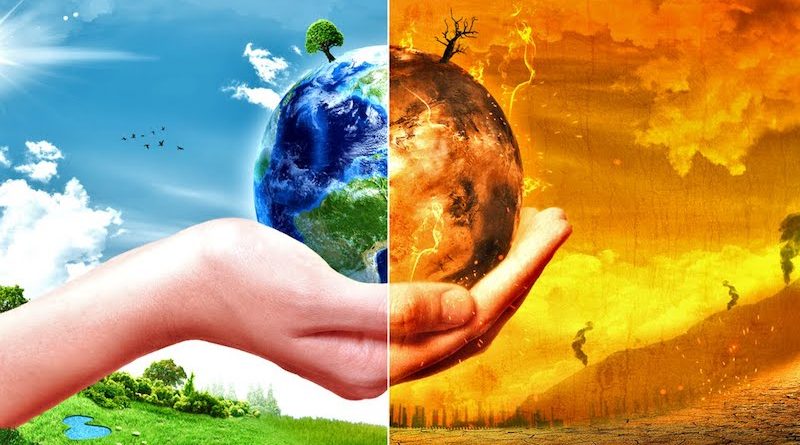Context:
Recently, the State of Global Climate Report, published by World Meteorological Organisation (WMO), confirmed that 2023 was the warmest year on record.
Key highlights of the Report:
- The global mean surface temperature in 2023 was 1.45 degrees Celsius higher than the average of the 1850-1900 pre-industrial period.
- The rate of sea level rise in the past ten years (2014–2023) has more than doubled since the first decade of the satellite record (1993–2002).
- 2016 and 2020 were previously recorded as the joint warmest years, with temperatures reaching 1.29 ± 0.12 degrees Celsius and 1.27 ± 0.13 degrees Celsius.
- The ten-year average 2014–2023 global temperature is 1.20 ± 0.12°C above the 1850–1900 average, the warmest 10-year period on record.
The ocean heat content in 2023 exceeded the 2022 value, thus reaching a 65-year high record.
- In 2023, nearly one-third of the global ocean experienced a marine heatwave, leading to significant harm to vital ecosystems and food systems.
- Concentrations of the three main greenhouse gases – carbon dioxide, methane, and nitrous oxide – reached record-high observed levels.
Reason highlights by report behind 2023 warmest year on record:
- Heatwaves: Brutal heatwaves struck several regions, including Europe, North Africa, and Canada. Records were broken in many places, with some European locations exceeding 48°C. Wildfires became more frequent and intense due to these conditions.
- Flooding: Excessive rainfall caused devastating floods in various parts of the world. The Greater Horn of Africa, South America, and Libya experienced particularly destructive flooding events.
- Drought: Long-term droughts persisted in several regions, including northwestern Africa, Central Asia, and the southern United States. Parts of South America faced their fourth consecutive year of below-average rainfall.
- Displacement: Millions of people were displaced due to extreme weather events. This includes internally displaced persons, refugees, and migrants. The complex situations in Syria, Yemen, Somalia, and Pakistan highlight the long-term consequences of displacement triggered by climate shocks.
- Food Security: Extreme weather conditions significantly impacted food security. Disruptions to agricultural production due to floods, droughts, and heatwaves exacerbated existing food insecurity issues. The number of people facing acute food insecurity globally more than doubled in 2023 compared to pre-pandemic levels.
World Meteorological Organisation (WMO)
- It is a specialized agency of the United Nations formed in 1950.
- Headquarters: Geneva, Switzerland
- Its mandate relates to the areas of meteorology (weather and climate), operational hydrology and related geophysical sciences.
World Meteorological day
- It is celebrated every year on 23 March, since 1951.
- The theme for World Meteorological Day 2024 is “At the frontline of climate action”
Initiatives to combat climate change
India:
- The National Action Plan on Climate Change (NAPCC): It aims to enable the country to adapt to climate change and enhance the ecological sustainability of India ‘s development path.
- India is a Party to the UNFCC, its Kyoto Protocol and Paris Agreement: Under the Paris Agreement in 2015, India had submitted its Nationally Determined Contribution (NDC) balancing the concerns and priorities of climate change, sustainable development including poverty eradication, and economic growth of the country.
India presented the following five nectar elements (Panchamrit) of India’s climate action:
- Reach 500GWNon-fossil energy capacity by 2030.
- 50 percent of its energy requirements from renewable energy by 2030.
- Reduction of total projected carbon emissions by one billion tonnes from now to 2030.
- Reduction of the carbon intensity of the economy by 45 per cent by 2030, over 2005 levels.
- Achieving the target of net zero emissions by 2070.
Global:
- The Conference of the Parties (COP 21) adopted Paris Agreement (2015): Its goal is to hold “the increase in the global average temperature to well below 2°C above pre-industrial levels” and pursue efforts “to limit the temperature increase to 1.5°C above pre-industrial levels.”
- International Carbon Action Partnership (ICAP), 2007: It functions as a multilateral forum of governments and public authorities focusing exclusively on cap-and-trade systems for Green House Gas mitigation.
- Intergovernmental Panel on Climate Change (IPCC), 1988: Its objective is to provide governments at all levels with scientific information that they can use to develop climate policies.

